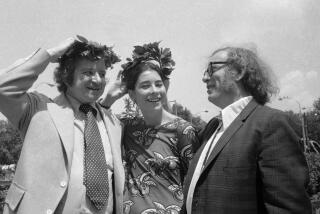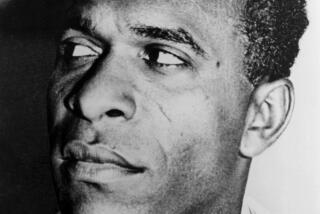Daniel Bell dies at 91; sociologist wrote about ‘post-industrial’ society
Daniel Bell, a leading sociologist of the past half-century who wrote groundbreaking books about the demise of revolutionary politics and about the economy and lifestyle of what he helped label a “post-industrial” society, has died. He was 91.
Bell died Tuesday at his home in Cambridge, Mass., after a short illness, said his son, David.
Daniel Bell was a teenage radical who in middle age became an apostle of pragmatism. He is credited for at least two seminal works: “The End of Ideology,” which predicted a post-Marxist, post-conservative era, and “The Coming of the Post-Industrial Society,” in which he prophesied the shift from a manufacturing economy to one based on technology.
“Many people would testify to his influence, and I am one of those,” said Nathan Glazer, his longtime friend and fellow sociologist. “He always had large ideas. He was enormously energetic and had an amazing memory of names and dates. And some of his ideas about what was happening to society were very much on target.”
Bell’s other books included “Work and Its Discontents,” “The Reforming of Education” and “The Cultural Contradictions of Capitalism,” which explored how a bourgeois economy coexisted with an anti-bourgeois culture.
For decades, Bell was a public intellectual and a widely quoted essayist; a co-editor of the Public Interest, a founding neoconservative journal; and a professor of sociology at Harvard University and Columbia University, where he helped mediate a campus rebellion in 1968.
Although Bell was linked politically to Public Interest co-founder and neoconservative “godfather” Irving Kristol, he left the magazine after a few years and followed no single line of thinking.
He believed in free elections and a regulated economy, but also valued cultural and moral tradition and scorned contemporary art. He defined himself as a liberal in politics, a socialist in economics and a conservative in culture.
Bell, the son of Jewish immigrants, was born in 1919 on Manhattan’s Lower East Side. His father died when Bell was an infant, and he grew up poor, learning Yiddish as his first language. He decided at age 13 that he was a socialist.
By his teenage years, he knew English well enough to read Marx and John Stuart Mill and study dialectical materialism. At City College of New York, he received a degree in sociology, but otherwise was steeped in debates with classmates Irving Howe, Kristol and Glazer, their gatherings recalled in the 1998 documentary “Arguing the World.”
After graduating from CCNY, Bell briefly attended Columbia as a graduate student but dropped out to write for the liberal journal the New Leader, where he soon became managing editor. In the 1940s, he taught at the University of Chicago and served as labor editor of Fortune Magazine.
Skeptical of Marxist formulas, he was more of a “socialist,” with a small “s,” than a Socialist. His first book, “Marxian Socialism in the United States,” was an exploration of why a Marxist revolution never occurred in the U.S., even during the Great Depression. His conclusion: Socialists were too rigid, too programmed for what was an essentially unprogrammed country.
He was married three times, most recently, in 1960, to literary critic Pearl Kazin.
He is survived by his wife, son, daughter Jordy Bell and four grandchildren.
More to Read
Start your day right
Sign up for Essential California for the L.A. Times biggest news, features and recommendations in your inbox six days a week.
You may occasionally receive promotional content from the Los Angeles Times.






